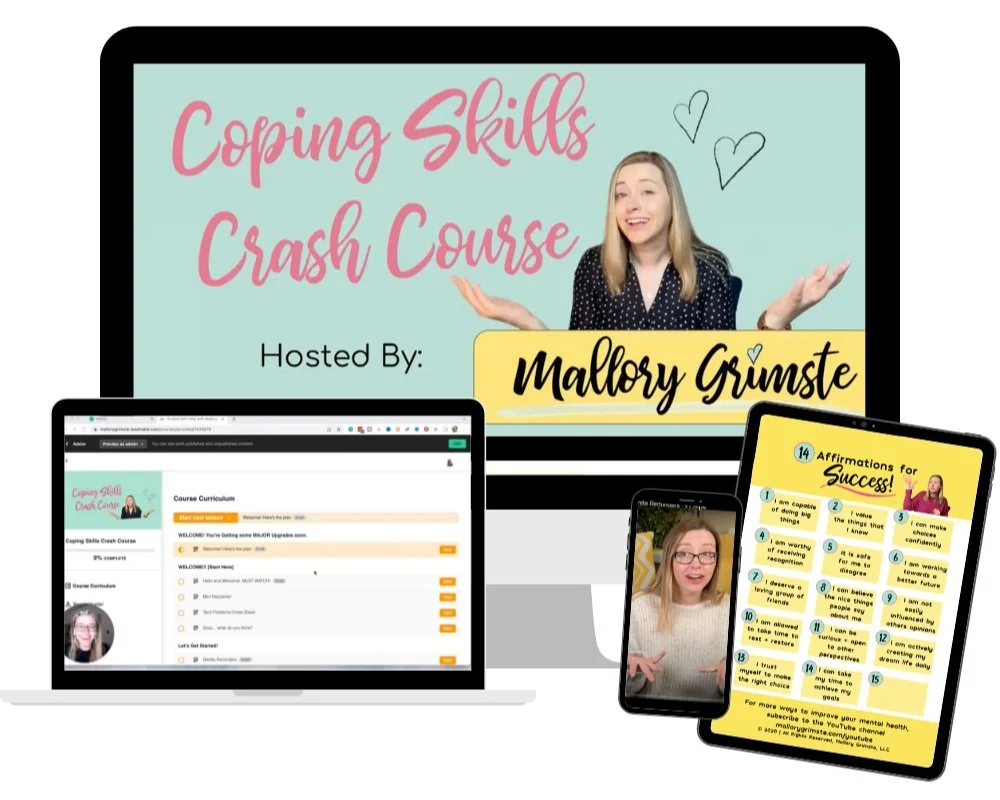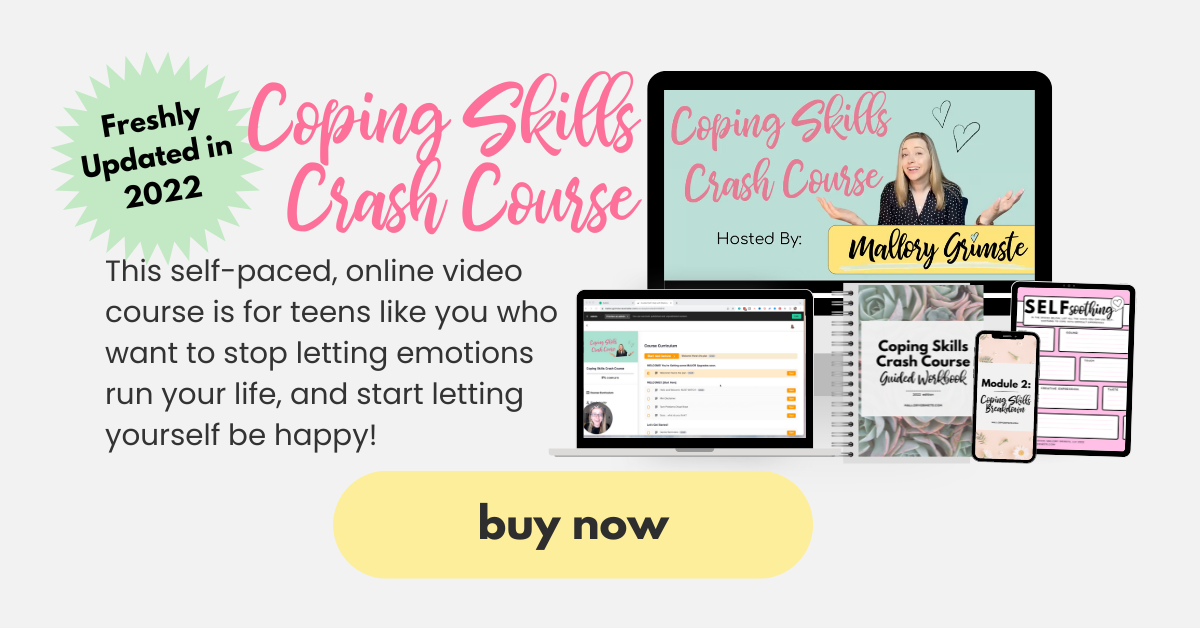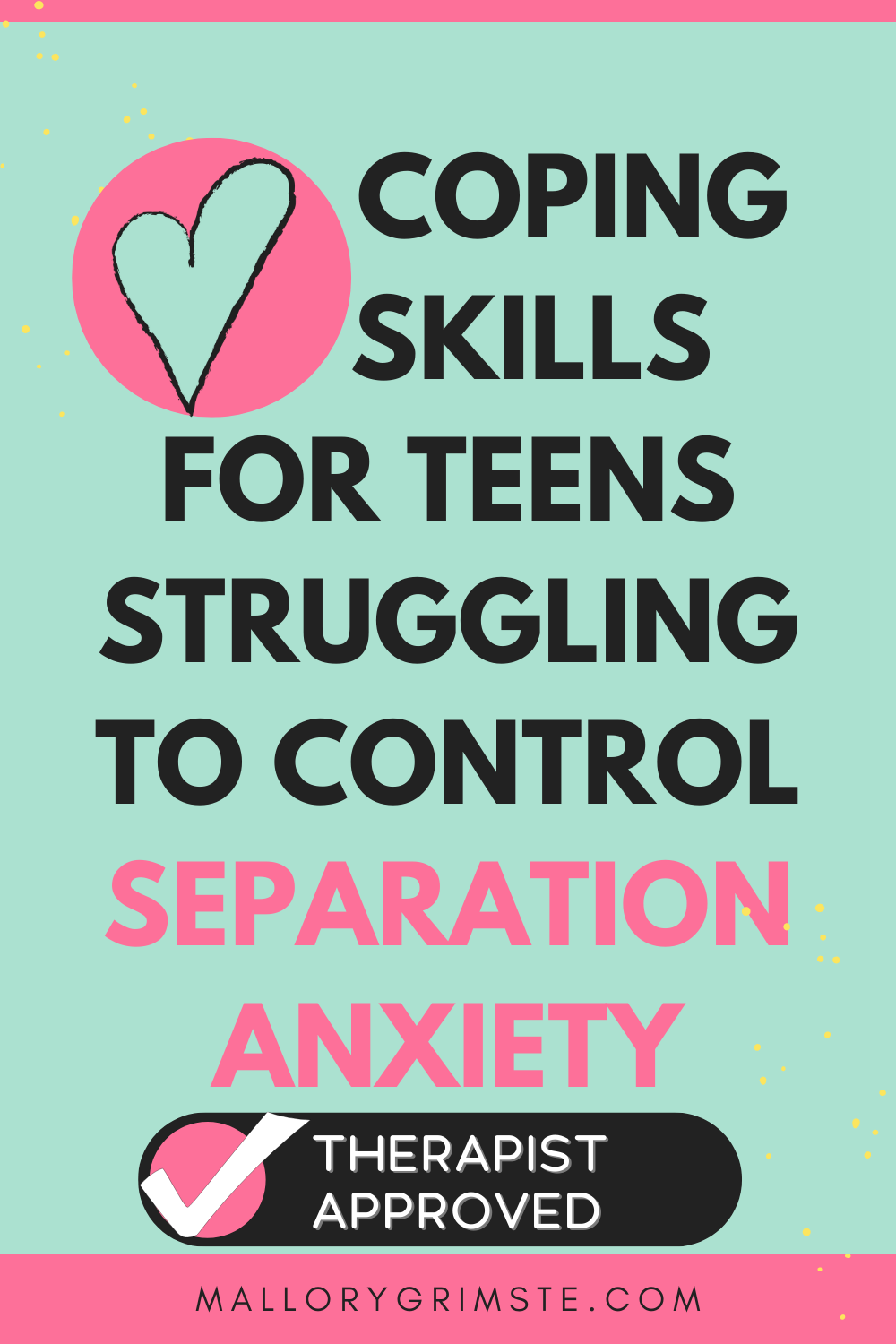CONTROL Separation Anxiety!! (tips for teens)
Separation Anxiety is a MAJOR problem for teens and it totally BUMS me out that there aren't more people talking about how to help y'all with this.
As a mental health therapist, I've seen more teens than ever struggling with this and it usually pops up in the form of avoiding school or leaving home.
But it can show up in other ways, too like sending multiple texts or messages in a row until someone responds or blocks you, or continuing to ask your friends if they actually like you or if they're mad at you.
🔔Subscribe here for MORE videos that help teens struggling with mental health: mallorygrimste.com/youtube
It's totally normal to worry about being away from the people you care most about.
Heck, it's one of the reasons why I stress out when one of my kiddos is running late to session and I haven't heard from them or their parents.
I CARE about y'all and your safety.
So what can you do to control your separation anxiety?
It really comes down to healthy Coping Skills.
Coping skills help you stay in control of your emotions so you can live a happier life.
FIGHT, FLIGHT + FREEZE
Before we get into ways to control your separation anxiety, we've gotta talk about the fight, flight, and freeze responses to stress.
Knowing what stress response you're in can help you control your separation anxiety in the moment and in the future. Then I'll share some of my favorite coping strategies for each of these stress responses so you can add them to your Coping Ahead Plan.
LIKE THIS VIDEO POST? I’D LOVE FOR YOU TO FOLLOW ME ON PINTEREST AND PIN IT FOR LATER!
Fight
All right, so fight is probably the most visibly interactive response that happens when we're feeling anxious from being separated from somebody that we care about.
Fighting can often look like:
→ actually fighting and arguing with somebody
→ picking a fight
→ lashing out
→ texting, or repeat messaging
Oftentimes with a fight response, we're looking for a response from the person that we're looking for a sense of security.
I think y'all remember in a previous video, I shared a story about when I went out on a date with a former ex-partner of mine, and I was really, really upset. I was very hangry at the time, and I didn't know how to manage my emotions at that moment, so I actually engaged in a fight response. I literally banged my knife and fork on the table and said take me seriously after picking a fight with them. 🙈
To be clear- I do NOT recommend that approach, but if you find yourself engaging in a fight response, you’ll probably wanna try one or more of these coping strategies:
→ Fact check the source. One of the things that I recommend to many of my clients in my counseling practice is to gather support from three separate data points before you settle on a thought or an experience. So if you are waiting for somebody to show up to your house at a certain time, and they haven't shown up yet, and they haven't responded from your text message, okay, that's one data source. You've tried to reach out to them directly.
Maybe a second data source is to check in on, are they usually on time, or are they usually a little bit late? I mean, we all have those friends that are notorious for being like 15, 20 minutes late, right?
And a third data source might be it hasn't been enough time yet.
→ Use Distractions to keep yourself occupied while you wait. Setting a timer, and then engaging in some sort of activity that you enjoy that takes up your attention can be really useful and helpful while you're waiting.
A lot of us, just like to wait and stew, and our thoughts just grow and grow and grow, and they make us more and more anxious. And now we've created this horrific story about they've been hit by a bear or something like that, or they're blowing us off. Could be a possibility, but probably unlikely. You wanna make sure that you're staying distracted while you're giving it time to play out.
In the Coping Skills Crash Course there is actually a whole module where we break down seven different distraction skills that you can use to cope with your separation anxiety.
You can find out more by clicking this link: mallorygrimste.com/copingskills
Freeze
Freezing happens when we literally freeze up, we stop responding, and we stop engaging. Sometimes our whole mind goes blank. We may even find ourselves dissociating, or feeling unreal, or not in the moment.
Freezing can also happen when you just don't know how to respond or how to engage. A lot of people will literally lose their voice. It's hard for them to talk, or hard for them to think clearly in order to communicate what it is that they're feeling.
Some of these people may look like they're not paying attention, or they may look like they're disengaging from the conversation, which can be really upsetting if you're a parent, and you're dealing with a teenager who's freezing. I get it. Just know that they may be having one of these freeze-moment responses.
→ One of the best ways to address a freeze response to separation anxiety is to literally ground yourself with some sort of self-soothing sensory activity. Try using one or more of your five senses to engage with so you can bring yourself back to the moment, right here right now.
→ One of my favorite sensory activities is actually applying some pressure. So hugging a pillow, hugging your pet, hugging yourself. All of these are great ways to apply some light pressure in a way that, of course, you're not gonna be like bruising or hurting yourself. We do not want that, but just enough that you're getting that sensory self-soothing activity.
Again, we break down this way more in-depth in the Coping Skills Crash Course.
Flight
So flight is probably, for many teenagers, one of your favorite coping strategies when it comes to any sort of stress. And that's because it can look and feel a lot like avoidance.
Taking a break or taking space can be healthy in moderation, as long as it ends. If it does not end, it's not a break, then you're literally avoiding or ignoring the situation.
That's where flight can get a little dicey, because a lot of people, when we feel so emotionally uncomfortable or overwhelmed, we just want it to end, we wanna get away from it.
We do not like feeling uncomfortable. There's a reason why we have all of these self-care activities that make us feel better physically and in turn boost our mood.
So flight in teenagers can look a lot like avoiding or procrastinating. It can look a lot like breaking up or ending friendships very quickly without giving them an opportunity to repair the friendship.
I always urge my teen clients, especially when it comes to other teenage friendships, not to be super quick to just totally end the friendship at the first sign of discomfort or disruption.
That's because as teenagers, y'all are learning and growing, and figuring out this life thing at the same time. Everybody's at a different pace. Everybody's having different experiences. And just like you are new to this, so are your other teenage friends.
So giving them an opportunity to know and understand, and potentially step up to the request that you're making in order to continue that friendship is huge.
That leads me to one of the very first things that you can do to help you when you are wanting to indulge a flee response, or flight response: communicate what it is that you're feeling. Honestly, feeling your feelings is huge.
Some of the strategies that we go over in the Coping Skills Crash Course, like improving the moment skills., can be majorly useful for a flight response.
These skills are really, really great when you can't necessarily change the circumstances, or your environment, or the situation. Like say that you get a flat tire, you have to deal with that flat tire, whether that is waiting for the tow truck to come, fixing the flat tire yourself, potentially patching or buying a brand new tire, which is not always convenient, especially when you're a teenager, and saving your money, right?
We can't always change the things that happen to us, or the things that stress us out, or make us anxious, but we can change the way that we experience them.
Coping Skills
Okay, so I know I've been talking a lot about coping skills, but stay with me here…
Coping Skills don't necessarily change or fix the problem, but they can help you get back in control which is why I created the Coping Skills Crash Course to help you get there faster.
The Coping Skills Crash Course is an online video program with 4 modules you can watch and learn from at your own pace.
Coping Skills Crash Course has helped teens like you experience MAJOR Benefits like…
👍 Mentally having more clarity and focus, so you can be in control of your thoughts.
👍 Physically feeling calmer & more relaxed so uncomfortable experiences are less overwhelming and intense.
👍 Emotionally, you are more in control & at peace, knowing that there will be spikes and bumps of distress & discomfort at times, but it feels much more tolerable moving forward.
👍 Best of all, breathing easier & feeling lighter knowing you have the skills & ability to work through stressful situations, and that these feelings won’t last forever.
Here’s a Brief Preview of What’s Included:
✓ In Coping Skills 101 you'll get an overview of what Coping Skills are and are not, how to tell if they're working and the 4 types of coping skills you need to survive any problematic thoughts, urges, or emotions
✓ I really love the way Dialectical Behavior Therapy breaks down the different coping strategies so you'll get the full Coping Skills Breakdown with my personal and professional spin on these strategies in the second module.
✓ After that you'll literally walkthrough how to create your own personalized Coping Ahead Plan before we recap everything and celebrate in the final module.
✓ You'll also get some thank you bonuses to help you along your self-care journey such as Self Care BINGO for teens, 14 positive affirmations for success, some guided meditations, and more.
✓ Oh and there is an interactive guided workbook you can use to take notes and follow along with games like the bio breaks word search.
And the best part is that you get access to the full program and all future upgrades as soon as you buy it. Trust me, you want to get in now because I have some really cool, super secret upgrades planned.
If you want a deeper dive into coping skills, and you're ready to STOP letting stressful situations, uncomfortable feelings, and negative thoughts & emotions take control over what you do…
…and instead, START feeling more prepared & confident showing up in certain places, or around certain people, that can bring up uncomfortable feelings…
the Coping Skills Crash Course is definitely for you!
WANT TO REMEMBER THESE TIPS? DON’T FORGET TO PIN IT!
IF YOU ARE CONCERNED THAT YOU, OR SOMEONE YOU KNOW, MAY BE CONSIDERING KILLING THEMSELVES, PLEASE CONNECT THEM WITH HELP.
SUICIDE PREVENTION LIFELINE
1-800-273-8255
✨ Call 24/7 ✨





